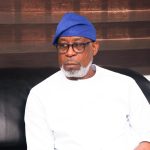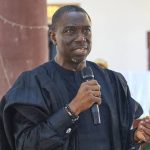NCC moves to save VAS operators from debts, N25bn at stake
By Theresa Igata
 Following complains by operators of interconnect clearing houses and Value Added Services licensees in the Nigeria telecoms industry over the huge indebtedness in their businesses the Nigerian Communications Commission says it has conducted a consultative process and is about concluding arrangements for introduction of a regulation to guide the activities of the VAS market which will substantially address the issues arising from VAS interconnect debt.
Following complains by operators of interconnect clearing houses and Value Added Services licensees in the Nigeria telecoms industry over the huge indebtedness in their businesses the Nigerian Communications Commission says it has conducted a consultative process and is about concluding arrangements for introduction of a regulation to guide the activities of the VAS market which will substantially address the issues arising from VAS interconnect debt.
This was disclosed by the Executive Vice Chairman of the Nigerian Communications Commission, Professor Umar Garba Danbatta at the Telecoms Executives and Regulators Forum held in Lagos.
According to Danbatta who was represented by the Engr. Ubale Maska, Executive Commissioner Technical Services, NCC: “On the VAS segment, we believe that the absence of detailed regulation with appropriate market segmentation is responsible for interconnect disputes. We have received reports, especially from the VAS providers, of alleged exploitation by the big operators. On the other hand, the service providers have complained about the parasitic nature of this service. There is also a fusion of roles between the identified market segments, resulting in distortions in the market”.
This is why; he added that the Commission is working on concluding the arrangements for introduction of a regulation to guide the activities of the VAS market which will substantially address the issues arising from VAS interconnect debt.
“Interconnect debts have not been really a big issue in the industry except in cases of disputes. But there have been cases of interconnect fees disputes between service providers. In such cases, the regulator has intervened”.
“Our approach to interconnect and VAS debts in the telecom industry is persuasive. The regulator is not interested in micro managing financial and relationships between, and among service providers, that have been substantially protected by subsisting commercial agreements”.
Though the Commission in the past one year through its intervention that has resulted in payments of about N10.5 billion from about reported N17 billion disputed interconnect debts, agreements have also been reached for the settlement of outstanding debts, he added.
Aside coming up with policies to tackle the issues of debt and revenue sharing amongst players, some stakeholders are of the view that a central clearing house will also help curb incidences of indebtedness which has led to increased loss of licenses by VAS Licensees.
The sharing formula for revenue generated through the services rendered by VAS licensees, stands at 70:30 per cent ratio, and most times 85:15 per cent ratio with telecoms operators having the lion share, the VAS operators said the sharing formula was putting them out of business. “Aside the small amount given to us by telecoms operators, they also delay payment for as long as two years running even when they have collected the money from customers who pay for the services rendered by VAS operators, using the platform of telecoms operators”.
However, the CEO Medallion Communications Ltd Ikechukwu Nnamani in highlighting some of the interconnect settlement challenges in Nigeria, said that none of the operators in Nigeria has a settlement scheme in place with their interconnect partners as invoices are sent out at the end of the month, and the operators just sit back and wait for payment from the interconnect partners.
It is only when payment is not received after a long period of time that dispute and reconciliation is embarked upon and this has led to high level of disputed interconnect indebtedness.
“Some of the operators are understaffed in the interconnect department. It is the same staff that handles the billing processing from the switch to invoicing and settlement. There is no proper crosschecking mechanism in place for human error correction”.
“The cumulative effect of the above interconnect settlement challenges is that there is today in Nigeria over NGN25 billion of interconnect debt, while variances in settlement invoice values can be as high as 20% and unpaid invoices ranging from 6 months to 3 years in arrears”.
“For a system that is 95 percent prepaid, the inability of pay for terminated calls cannot be blamed on the subscribers not being able to pay the telecom operators. 60 to 70% of all interconnect debts in Nigeria are disputed debts. This is because over 95% of the interconnect calls are still passed on a peer-to-peer basis amongst the operators, resulting in disputes and inability to reconcile call records”.








